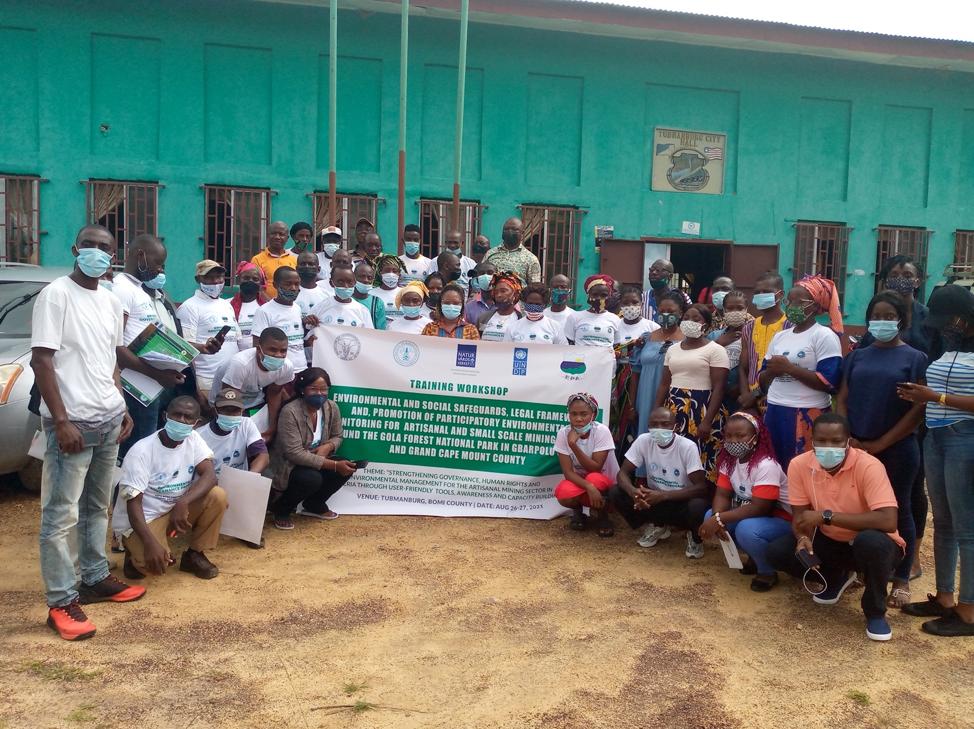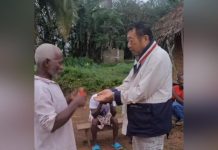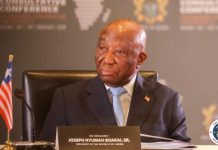
Africa-Press – Liberia. Tubmanburg, Bomi County
– The United Nations Development Program (UNDP) in partnership with the Society for the Conservation of Nature of Liberia (SCNL) along with several partners on Thursday, August 26, began a two-day Environmental safeguard training workshop for artisanal and small scale miners operating within the Gola Forest Landscape.
The event which took place at the Tubmanburg City Hall, is being held under the theme: “Strengthening governance, human rights and environmental management for the artisanal mining sector in Liberia through user-friendly tools, awareness and capacity building”
It is being funded by the UNDP through the Swedish International Development Cooperation Agency (Sida) and SCNL through the Critical Ecosystem Partnership Fund (CEPF) to build capacity for ASM activities.
Moreover, the overall objective of the training is to have sustainable local economies in forest corridors to secure a network of protected areas covering at least 30% of Liberia’s existing forest area.
Representing the UNDP, the Program Coordinator of UNDP-Liberia E. Abraham T. Tumbey Jr. termed the mining sector as bitter-sweet, according to him, it helps citizens to gain fast income in hard to reach areas but also its seriously associated with environmental pollution, abuse of rights, something he believes can be handled collaboratively.
“To make sure that artisanal and small skill mining can be done in a safe way so that the communities that are a host to these mining operations are not at risk; so that the rights of women and children are protected and the miners themselves are able to get the value for money for their labor…,” he stated. He noted that over the years the ASM sector has been identified by the Ministry of Mines as a sector with potential amidst the many challenges.
Also, the Executive Director of SCNL, Michael Garbo, stressed that it’s necessary that small scale miners be involved in such a meeting so that they understand that they[miners] were brought as participants not to scare them away from mining activities but rather to educate them on ways to practice sustainable and smart mining.
“It doesn’t mean that the government of Liberia want you to stop mining ..no; we are not telling you women that are here along with men that you should not find food for your children; so we at the SCNL is joining the gov’t and partners to educate you on smart mining for the betterment of all of us,” stressed Garbo.
He, however, called on miners to look at the safeguard measures so as to adapt and apply it when mining and at the same time network with government representatives at the training to understand the issue of safeguarding the environment in the best way possible.
“How can we mine safely? How can we save ourselves, stop pollution, respect the rights of women and children while being able to earn income from mining,” he explained.
Also speaking, the secretary-general of the Federation of Miners Association of Liberia (FOMAL) Abraham B. Gappie applauded the organizers for the event but called on all stakeholders present to take the issue of mining ‘Seriously’ because the harmful effects of mining may not only affect miners but everyone, one way or the other.
“Because as ASM actors, we have realized that people are heavily involved with the use of mercury which is dangerous to the environment,” explained Gappie.
Meanwhile, the Regional Forester of the Forest Development Authority, Ruth K. Varney warns that even though all Liberians are entitled to Liberia’s Vast forest, miners should mine properly so that the forest landscape cannot be destroyed because of bad mining practices.
“We cannot say do not do your mining or the government is not stopping it but mine sustainably so that you’ll be able to help your family and country at large by not destroying the entire landscape,” she cautioned. Giving remarks, the Assistant Minister of Land, Mines and Energy, Johnson Willabo expressed gratitude for being a part of such collaboration.
“We decided to work together to see how we can protect the forest. While we are trying to do this, one of the things we are trying to put in place is to inform our miners that the protected areas are areas you are not supposed to go; so that we can all put together and make sure that those areas are reserved and at the same time mining sustainably in areas approved by the Ministry of Mines,” stated the Minister.
Representing the EPA, the Energy and Environment Coordinator at the EPA, Salimatu Lamin Galiyeneh, called on the participants to be fully engaged and network so as to create easy access to information sharing relating to environmental degradation and ASM.
“We cannot overemphasized the work that we as Liberians need to do to not only protect and manage our natural resources, but to be able to find innovative measures to mitigate and adapt to climate change; our resources are quite good but if we do not sustainably manage them then we are going to impact our own lives negatively,” she stressed.
Bah-Wah Brownell, Director of the Department of Planning, Internal Monitoring and Evaluation unit at the Independent National Commission on Human Rights-INCHR noted that in line with the commission’s mandate to protect and promote human rights across the country it is partnering with the organizers of the training to make sure that miners mine responsible and most importantly reducing the human right risks among miners.
Meanwhile, an ASM working group and Secretariat are already in for engagement and dialogue on ASM; to improved inter-agency and stakeholders collaboration to support participatory monitoring and provide capacity building for miners on sustainable mining practices.





